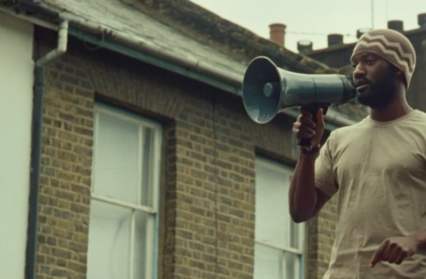Matt Taylor reviews Mangrove, the first film in Steve McQueen’s five-part anthology shining a spotlight on Black British history.

In the last few years, but particularly in 2020, much has been made in the worlds of film and television about America’s ongoing issue with racism. With such a spotlight on the US, it’s very easy for us in the UK to think of systemic racism as an America-only issue – but this is factually not the case. As Steve McQueen’s Small Axe aims to show, the UK is far from innocent when it comes to racism. Mangrove, the first of five films in the series, grapples with this fact head-on and stands tall as a remarkable achievement for Black British cinema that is easily one of 2020’s best films.
The film follows the true story of the Mangrove Nine, a group of Black Brits who were arrested by Notting Hill police for inciting a riot – but the case was built on falsified evidence. It also came after years of unlawful, racially charged raids by police officers. It’s a sadly all-too-familiar setup for McQueen’s film, and it isn’t an easy watch by any stretch of the imagination, but it is necessary viewing for every single British citizen today. It just might be the most important film to come out of the UK this century, because after all the attention #BlackLivesMatter has been given this year, we need to move forward – but in order to do that, we must first understand where we have come from.
One of Mangrove’s most laudable elements is its sheer ferocity. It makes no attempt to hide the fact that Frank Crichlow (the owner of the titular restaurant, which became a hub for Notting Hill’s West Indian community in the late 60s) is the victim of racist attacks by the very organisation that is supposed to protect him – and why would it? Such are the facts of the story, and to shy away from them would be to do a disservice to everything the Mangrove stood for. McQueen doesn’t skirt around the issues of racist police officers, but tackles them head-on, and forces his viewers to confront every internal belief we hold about institutions put in place to keep us safe.
To make his points, McQueen needs a great team both in front of and behind his camera – and thankfully, he’s got it. Letitia Wright is on show-stealing form as Altheia Jones-LeCointe, leader of the British Black Panthers. Altheia is willing to do whatever it takes to resolve the situation, and Wright perfectly portrays her faultless commitment. A stand-out scene of her trying to convince Frank not to take a guilty plea perfectly showcases both Wright’s tremendous acting capabilities and the importance of maintaining the fight, even when the odds might be stacked against us.
She’s supported by an excellent Malachi Kirby as Darcus Howe, broadcaster, writer, and campaigner. In many ways Darcus is the face of the revolution to the wider British public, as he’s able to use television broadcasts as a medium for his message of equality. He speaks with more eloquence, grace, and levity than many elected officials, and Kirby does a truly stellar job of bringing him to life.
At the heart of Mangrove is an excellent Shaun Parkes as Frank Crichlow, the restaurant owner who just wants to live his life, but finds himself dragged into a fight he initially doesn’t want to be a part of. It’s hard to imagine anyone other than Parkes in the role; he imbues Frank with such unending humanity and humility that it’s impossible not to be swept up with him. He’s so humble that he doesn’t realise what a pillar he’s become for his community, and when that community is threatened he’s forced to consider what he holds dearest.
What is perhaps most enticing about Mangrove is its lack of answers. Regardless of the verdict in the court trial the film shows, we see no happy ending for Frank. It ties into a feeling of extreme discomfort that the film brings with it, and it’s a feeling that’s extremely hard to shake. Mangrove actually ends up scarier than many horror films because of the realism of the situations it portrays: these awful things happened, these horrible people existed, and nothing has changed – there is still plenty more work to be done.
As a jumping-off point for the Small Axe series it’s extremely promising: as Darcus himself says, what we see here is the start of something incredible. For all his cinematic achievements over his lifetime, Steve McQueen has truly outdone himself with Mangrove. Its importance to Britain in this moment cannot be overstated – by turns endearing, shocking, heartbreaking and haunting, McQueen pulls back the curtain and shows us just how much more work we have to do to truly defeat racism in the UK. Make no mistake: Mangrove is nothing short of a masterpiece.
Mangrove is available to stream now on BBC iPlayer.
Matt Taylor is a regular contributor at Wales Arts Review.











